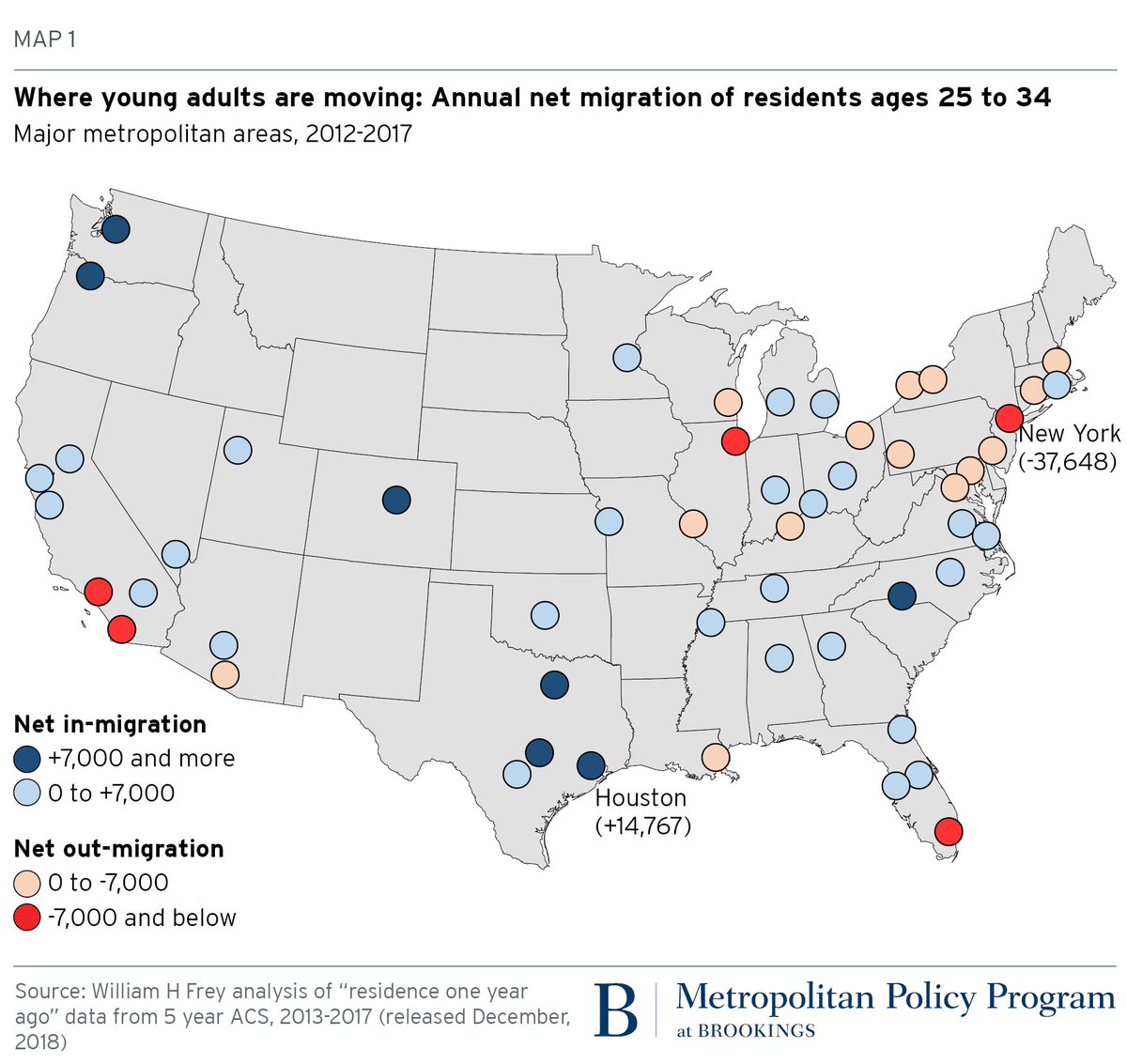Why Houston is the best city in Texas and #1 attracting young adults, HTX vs. NYC opportunity zones, and more
Lots of good items this week:- Brookings: Houston #1 in the country for attracting young adults! Take that, Austin ;-) Biggest loser: NYC, surprise surprise!
- CNN: The top nine reasons to visit Houston in 2019
- The Market Urbanism Report re-featured one of my old posts comparing Houston and New York opportunity zones.
- Bloomberg: Why America’s New Apartment Buildings All Look the Same. Houston definitely has plenty of these, but I don't mind since they provide plenty of housing supply to keep rents down.
- Wired: Americans are abandoning transit, but don't blame Uber. Hat tip to Leslie.
- How Houston has virtually ended homelessness among veterans.
- A Hypothesis About Airport Connectors. Metro needs to keep any airport connectors we build to affordable BRT. Excerpt on why they're politically popular but don't make economic sense:
"However, what I propose is that the high cost of airport connectors is not because the elite spends money on itself. Rather, it’s because many ordinary middle-class people fly a few times a year and wish for better airport transit, without thinking very hard about the costs and benefits. An airport connector appeals to a very wide section of the population, and may be very cheap if we divide the cost not by the number of daily users but by the number of unique annual users. Hence, it’s easier for politicians to support it, in a way they wouldn’t support an excessively costly subway line connecting a few residential neighborhoods to the city."Finally I wanted to end with this great excerpt from Scott at the Market Urbanism Report on why Houston is the best city in Texas. I'm even quoted in this one! Here's the summary quote I tweeted:
"Houston is easily my favorite Texas city, because it combines the best aspects of the other three... I prefer density over sprawl, big over small, new over old, and diversity over monoculture."And here's the more extensive excerpt:
Houston
"Houston is easily my favorite Texas city, because it combines the best aspects of the other three. The metro area is similar in size to Dallas, and has the same rapid growth, ethnic diversity, and global feel. In fact, Dallas and Houston sit alone together as America’s foremost boomtowns, each growing by more than 144,000 last year throughout the metro area (the third place MSA, Atlanta, grew by a mere 95,000). But, like San Antonio and Austin, Houston has remained more tasteful than Dallas, with numerous interior neighborhoods that are urban, walkable, and separated from the innards of the city.
Not only is Houston Texas’ best city; it is among a handful of emerging ones in the U.S.—including Los Angeles, San Diego, Miami, Denver, Atlanta and Seattle—that will become the dense infill cities of tomorrow, joining the coastal legacy cities. The thing that differentiates Houston from the others, though, is that it doesn’t have the regulatory hurdles to stop this fundamentally market-oriented process. The city has no zoning code, which means a range of densities, uses and architectural styles can go anywhere in the city.
The folk wisdom is that this turned Houston into a sprawling mess like Dallas. But densification is already happening in Clutch City. This year it will lead the nation in multi-family housing construction, with 25,935 units entering the market (Dallas is #2 at 23,159). Much of this is going up rapidly via mid-rises in interior neighborhoods like Midtown, Montrose and Rice Military. Houston has the highest Walk Score of Texas’ big cities. Dallas, meanwhile, may feel more fragmented because of the low-density zoning in its central areas.
Of course, my choice, like anyone’s, is clouded by bias; I prefer density over sprawl, big over small, new over old, and diversity over monoculture."
Labels: density, development, growth, land-use regulation, Metro, mobility strategies, opportunity urbanism, perspectives, rankings, tourism, transit, walkability





6 Comments:
I'm surprised that NYC finished last over Chicago.
The big 3 lost the most: NYC, LA, and Chicago. NYC has twice the population of Chicago, so it's not surprising they lose more. A lot of people go to NYC in their 20s and when it gets old they head home.
That is true. But Chicago is still doing bad. Chicago does not have the benefit of being a immigrant draw like Houston or NYC. In terms of population loss Chicago is #1.
True https://www.aaronrenn.com/2018/03/29/population-transformation-in-pittsburgh-and-chicago/
New York vs Houston for draw zones.
New York Fixed link
Post a Comment
<< Home